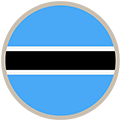International indirect tax guide
This tax guide provides an overview of the indirect tax system and rules to be aware of for doing business in Botswana.
| Indirect tax snapshot | |
|---|---|
|
What are the current rate(s) of Indirect tax?
|
|
|
Are there any confirmed or anticipated changes to these rates?
|
No.
|
|
What is the principal indirect tax?
|
In Botswana, Value Added Tax (VAT) is the principal indirect tax and it is levied on the supply of taxable goods and services by a registered vendor and on importation of taxable goods and services.
|
|
Is there a registration limit for the tax?
|
Yes. VAT registration is mandatory where a person regularly or continuously makes taxable supplies, in Botswana or partly in Botswana, exceeding or expected to exceed P1 million in a period of 12 months and registration is voluntary where the value of taxable supplies exceeds P500 000 in a twelve-month period.
|
|
Does the same registration limit apply to non-established businesses?
|
Yes.
|
|
Does a non-established person need to appoint a fiscal representative in order to register?
|
No, however, a non-established person, as with all VAT vendors, is required to appoint a Botswana resident individual as public officer or a representative who is responsible for performing any duty, including the payment of tax, imposed on the non-established person under the Value Added Tax Act.
|
|
How often do returns have to be submitted?
|
A registered person is required to submit VAT returns on a monthly basis where annual taxable turnover exceeds BWP12 million or bi-monthly basis where annual taxable turnover is BWP12 million or less.
|
|
Are penalties imposed for the late submission of returns/payment of tax?
|
Yes. There are penalties for late submission of VAT returns at a rate of 10% of the tax payable for each month or part thereof that the return remains outstanding and P5 000 for a late ‘nil’ or refund return. Compound interest at the rate of 1.5% per month or part of a month is levied on late remittance of VAT.
|
|
Are any other declarations required?
|
Yes. Vendors making exempt supplies or who are not registered are required to declare and pay VAT on imported services within 30 days of importing the service. An importer is required to declare the goods for VAT purposes at the point of entry into Botswana.
|
|
Are penalties imposed in other circumstances?
|
Yes. Penalties of up to 200% of the additional tax chargeable may be imposed for providing false or misleading information or statements or omission of information and Failure to register and account for VAT attracts penalties equivalent to 200% of the output tax that should have been levied in the period of non-compliance.
|
|
Can the tax incurred by overseas businesses be claimed if they are not registered in your country?
|
No. Only registered VAT vendors can claim input tax.
|
|
Deduction of VAT
|
|
|
Is there any specific legislation to tax non-resident supplies of electronically supplied/digital services to private consumers resident in your country?
|
There is no specific provision to tax non-resident supplies electronic/digital services to private consumers. However, in the 2025/26 national budget the Minister proposed the introduction of VAT on digital trade.
|
Contact us
For further information on indirect tax in Botswana please contact:
|
Anthony Quashie |


